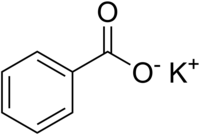Potassium benzoate

| |
| Names | |
|---|---|
| IUPAC name
Potassium benzoate
| |
| Other names
Benzoic acid, potassium salt
| |
| Identifiers | |
3D model (JSmol)
|
|
| ECHA InfoCard | 100.008.621 |
| EC Number |
|
| E number | E212 (preservatives) |
PubChem CID
|
|
CompTox Dashboard (EPA)
|
|
| |
| Properties | |
| C7H5KO2 | |
| Molar mass | 160.2117 |
| Appearance | White solid |
Except where otherwise noted, data are given for materials in their standard state (at 25 °C [77 °F], 100 kPa).
| |
Potassium benzoate (E212), the potassium salt of benzoic acid, is a food preservative that inhibits the growth of mold, yeast and some bacteria. It works best in low-pH products, below 4.5, where it exists as benzoic acid.
Acidic foods and beverages such as fruit juice (citric acid), sparkling drinks (carbonic acid), soft drinks (phosphoric acid), and pickles (vinegar) may be preserved with potassium benzoate. It is approved for use in most countries including Canada, the U.S., and the EU, where it is designated by the E number E212. In the EU, it is not recommended for consumption by children.[1]
Potassium benzoate is also used as the whistle in many fireworks.[clarification needed]
Mechanism of food preservation
The mechanism of food preservation begins with the absorption of benzoic acid into the cell. If the intracellular pH changes to 5 or lower, the anaerobic fermentation of glucose through phosphofructokinase is decreased by 95%.[2]
Safety and health
In combination with ascorbic acid (vitamin C), sodium and potassium benzoate may form benzene, a known carcinogen. Heat, light and shelf life can affect the rate at which benzene is formed. The Food and Drug Administration was performing tests in 2006, but the Environmental Working Group is calling for the FDA to publicly release all tests and use their authority to force companies to reformulate to avoid the potential benzene forming combination.[3]
Potassium benzoate was recently described by the Food Commission, who campaign for 'safer, healthier food in the UK', as "mildly irritant to the skin, eyes and mucous membranes". [4]
Cats have a significantly lower tolerance to benzoic acid and its salts than rats and mice.[5]
The substance's supposed detrimental health effects were lampooned in a segment of the Treehouse of Horror III episode of the popular animated series The Simpsons. In the segment (called "Clown Without Pity"), Homer purchases a cursed Krusty the Clown doll for Bart's birthday. The owner of the shop who sells it to him gives him a free frozen yogurt, but warns him that the yogurt is also cursed, but Homer gets his choice of toppings. When the owner tells Homer menacingly that the toppings contain Potassium Benzoate, Homer stares blankly at the owner who says "...that's bad", to which Homer replies, "Can I go now?"
See also
References
- ^ Cosmetic Ingredient Review Expert Panel Bindu Nair (2001). "Final Report on the Safety Assessment of Benzyl Alcohol, Benzoic Acid, and Sodium Benzoate". Int J Tox (20 (Suppl. 3)): 23–50.
- ^ Krebs HA, Wiggins D, Stubbs M (1983). "Studies on the mechanism of the antifungal action of benzoate". Biochem J (214): 657–663.
{{cite journal}}: CS1 maint: multiple names: authors list (link) - ^ Press Release from the Environmental Working Group
- ^ Published in The Food Magazine issue 77from the Food Commission UK
- ^ Bedford PG, Clarke EG (1972). "Experimental benzoic acid poisoning in the cat". Vet Rec (90): 53–58. PMID 4672555
